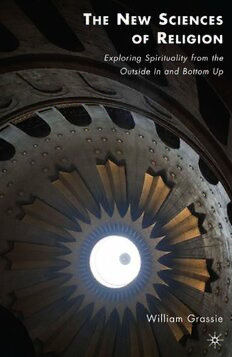
The New Sciences of Religion: Exploring Spirituality from the Outside In and Bottom Up PDF
285 Pages·2010·1.859 MB·English
Most books are stored in the elastic cloud where traffic is expensive. For this reason, we have a limit on daily download.
Preview The New Sciences of Religion: Exploring Spirituality from the Outside In and Bottom Up
Description:
The New Sciences of Religion is a critical analysis of new scientific research on religious and spiritual phenomena. William Grassie takes a two-staged phenomenological approach working from the “outside in” and the “bottom up” without privileging at the outset any religious traditions or philosophical assumptions. Using insights from economics, evolutionary psychology, the neurosciences, and medicine, Grassie develops a complex and multifaceted understanding of religion as potentially functional and dysfunctional in specific contexts, differentially so for individuals and groups. The New Sciences of Religion then asks what in religion and spirituality might also be true and profound when our received traditions are reinterpreted in light of contemporary sciences. In contrast to the New Atheists, Grassie argues for a concept of God-by-whatever-name that is fully compatible with contemporary science and the reinterpretation of traditional religions. In the end, there is no grand unified theory of religion and none of the many scientific explanations of religion preclude that religions have intuited, experienced, and discovered true and profound insights into the nature of ultimate reality and human existence. This is an original and compelling scientific interpretation of religion and also a religious interpretation of science that will challenge and delight students and scholars alike.
See more
The list of books you might like
Most books are stored in the elastic cloud where traffic is expensive. For this reason, we have a limit on daily download.
